SUBLET
Directing: B+
Acting: B
Writing: B+
Cinematography: B
Editing: B+
If you like movies that feature almost exclusively characters hanging out and talking, having interesting conversations, then Sublet is the kind of movie for you. That is, if you also find the contextualization of gay queer characters exploring Tel Avid compelling. That contextualization aside, if you’re not into “talky” movies, then this is one you’ll want to avoid. It’s all a matter of cinematic preference, really.
I quite enjoyed it. Sublet is directed and co-written by Eytan Fox, who has a history of exploring queer character in his films. He did the 2002 film Yassi & Jagger, a gay romance between two Israeli soldiers; he also directed the phenomenal film Walk on Water, about a bereft Israeli widower hit man who befriends a gay German tourist with the intent of gathering information about his Nazi war criminal grandfather, which wound up being my fourth-favorite film of 2005.
Fox is not especially prolific—he hasn’t directed a feature film since 2013—but he clearly has talent. That said, Sublet feels like a smaller film than some of his earlier works, at least in terms of production, theme, and ambition. That’s no major reflection on its quality; sometimes a story benefits a great deal from stripping down to simplicity. And even this film has its share of layers and nuance.
It’s the story of a short term relationship between men of two very different generations. We never learn the respective ages of Michael (John Benjamin Hickey), a New York Times travel writer visiting Tel Aviv for five days, and Tomer (Niv Nissim), the young man from whom he sublets his apartment and who winds up showing him around the city. But, we can find the ages of the actors, which are 57 and 27, respectively. That’s a thirty-year difference—an almost shockingly wide difference now that I consider it with actual numbers. It could be argued that the most impressive achievement of Sublet is that for most of its run time it depicts this relationship as platonic, until it isn’t. But it’s never creepy or especially salacious; in fact it’s surprisingly sweet. I can think of few, if any, other movies that manage to make such a relationship feel totally acceptable and natural.
Part of it is that the relationship is very brief, by design: Michael and Tomer only know each other for five days. Michael has a partner back in New York, and is processing a tragic event that occurred recently in their lives. Tomer actively avoids labels, which is why I hesitate to call him “gay” but he definitely qualifies as queer; he has idealistic ideas of living without any constraints of monogamy or even commitment. There’s a uniquely realized scene in which Tomer invites another young man over via “the Israeli Grindr,” as he puts it, “for both of us,” and ultimately it qualifies as the one sex scene in the film. It’s the kind of scenario in which one participant could easily be manipulating another, but it never comes across that way. At that point, though, Michael politely leaves the two younger men to each other, in that particular moment making the right decision.
Even this is a few days into Michael’s visit, his and Tomer’s connection developing organically. Fox introduces each day as the beginning of what becomes basically five chapters (“Day One,” etc). Tomer is intent on crashing on friends’ couches for the week, but Michael suggests he just stay at home and sleep on the couch, and in exchange Tomer will serve as his tour guide to see “the real” Tel Aviv for his travel piece.
As the story thus progressed, I was reminded of the Before Sunrise films, with such a focus on two characters forging a connection through a succession of intellectually stimulating conversations. The themes and topics covered in the Before Sunrise films are far denser than they are here, but it’s broadly the same idea. And in contrast to the Richard Linklater films, Eytan Fox throws in minority sexuality and cross-generational ideas and ideals. It makes for very compelling viewing, if you’re into that sort of thing.
I very much am. At times, the acting in Sublet feels slightly unrehearsed, but its well crafted script is its greatest strength. By the end, I was more moved than I might have expected to be at the start. That kind of pleasant surprise is always a welcome turn of events.
Sometimes it’s not so hard to bridge the gap.
Overall: B+
[available VOD, $4.99.}]










